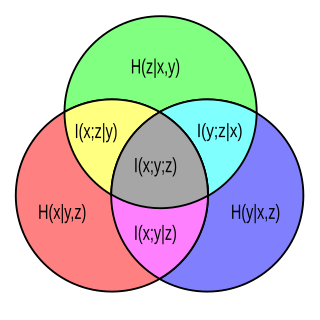Top Qs
Timeline
Chat
Perspective
Dual total correlation
From Wikipedia, the free encyclopedia
Remove ads
In information theory, dual total correlation,[1] information rate,[2] excess entropy,[3][4] or binding information[5] is one of several known non-negative generalizations of mutual information. While total correlation is bounded by the sum entropies of the n elements, the dual total correlation is bounded by the joint-entropy of the n elements. Although well behaved, dual total correlation has received much less attention than the total correlation. A measure known as "TSE-complexity" defines a continuum between the total correlation and dual total correlation.[3]
Remove ads
Definition

For a set of n random variables , the dual total correlation is given by
where is the joint entropy of the variable set and is the conditional entropy of variable , given the rest.
Remove ads
Normalized
The dual total correlation normalized between [0,1] is simply the dual total correlation divided by its maximum value ,
Remove ads
Relationship with Total Correlation
Summarize
Perspective
Dual total correlation is non-negative and bounded above by the joint entropy .
Secondly, Dual total correlation has a close relationship with total correlation, , and can be written in terms of differences between the total correlation of the whole, and all subsets of size :[6]
where and
Furthermore, the total correlation and dual total correlation are related by the following bounds:
Finally, the difference between the total correlation and the dual total correlation defines a novel measure of higher-order information-sharing: the O-information:[7]
- .
The O-information (first introduced as the "enigmatic information" by James and Crutchfield[8] is a signed measure that quantifies the extent to which the information in a multivariate random variable is dominated by synergistic interactions (in which case ) or redundant interactions (in which case .
Remove ads
History
Summarize
Perspective
Han (1978) originally defined the dual total correlation as,
However Abdallah and Plumbley (2010) showed its equivalence to the easier-to-understand form of the joint entropy minus the sum of conditional entropies via the following:
Remove ads
See also
Bibliography
Wikiwand - on
Seamless Wikipedia browsing. On steroids.
Remove ads

















![{\displaystyle {\begin{aligned}&D(X_{1},\ldots ,X_{n})\\[10pt]\equiv {}&\left[\sum _{i=1}^{n}H(X_{1},\ldots ,X_{i-1},X_{i+1},\ldots ,X_{n})\right]-(n-1)\;H(X_{1},\ldots ,X_{n})\;.\end{aligned}}}](http://wikimedia.org/api/rest_v1/media/math/render/svg/ea2e782114729ee959c0d4daea12add31155c9e2)
![{\displaystyle {\begin{aligned}&D(X_{1},\ldots ,X_{n})\\[10pt]\equiv {}&\left[\sum _{i=1}^{n}H(X_{1},\ldots ,X_{i-1},X_{i+1},\ldots ,X_{n})\right]-(n-1)\;H(X_{1},\ldots ,X_{n})\\={}&\left[\sum _{i=1}^{n}H(X_{1},\ldots ,X_{i-1},X_{i+1},\ldots ,X_{n})\right]+(1-n)\;H(X_{1},\ldots ,X_{n})\\={}&H(X_{1},\ldots ,X_{n})+\left[\sum _{i=1}^{n}H(X_{1},\ldots ,X_{i-1},X_{i+1},\ldots ,X_{n})-H(X_{1},\ldots ,X_{n})\right]\\={}&H\left(X_{1},\ldots ,X_{n}\right)-\sum _{i=1}^{n}H\left(X_{i}\mid X_{1},\ldots ,X_{i-1},X_{i+1},\ldots ,X_{n}\right)\;.\end{aligned}}}](http://wikimedia.org/api/rest_v1/media/math/render/svg/7e0c41d6465fc1a44a28ba153c9003e6bc75652c)